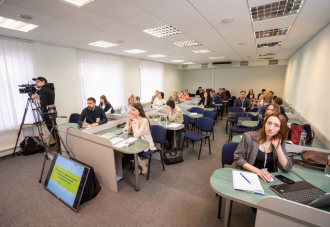Program 3.0 mentors learned about the towers of strength needed to achieve a common goal in cooperation with mentees, as well as about personal skills important in this process.
Organizational coach and trainer Viktoriia Mryshuk continued to tell mentors about the specifics of mentoring and share work tools.
In particular, she reminded that the mentor-mentee interaction consists of 4 stages:
- Drawing up the map: Assessing the lay of the land and potential;
- Finding and agreeing on a route: Goals and paths;
- Developing the mentee’s abilities and the organization’s potential;
- Pauses for monitoring and adjustments.
The meeting participants discussed the difficulties that, in their opinion, may arise at each of these stages. In additional materials, the trainer offered solutions that can minimize common risks.
According to Ms. Viktoriia, contracting is important to get a mentee started: “Contracting provides clarity about what should happen, what roles and expectations we have, what behavior we expect from others.”
Some of the advice offered by the trainer is to be as specific as possible, avoid overgeneralization and pay attention to contracting (clear preliminary agreements)
“A very important skill of a mentor, in addition to specificity, is to be able to correlate available resources, available tools, and what I can take to work with the mentee,” added Viktoriia Mryschuk.
The expert advises mentors to use the “Complaint – Desire – Solution” tool in their work. This is a set of clear questions that help clarify the mentee’s needs, clarify the request and agree on their role in the process.
Let us recall that on February 23rd, Mentorship Program 3.0 to strengthen the advocacy and other capacities of civil society organizations was officially launched. Twelve organizations from across Ukraine will learn from mentors to develop capacity in advocacy, inclusive development, gender and financial sustainability.
Mentorship Program 3.0 is being implemented as part of the Project Ukraine Civil Society Sectoral Support Activity implemented by the Initiative Center to Support Social Action “Ednannia” in partnership with the Ukrainian Center for Independent Political Research (UCIPR) and Centre for Democracy and Rule of Law (CEDEM).



